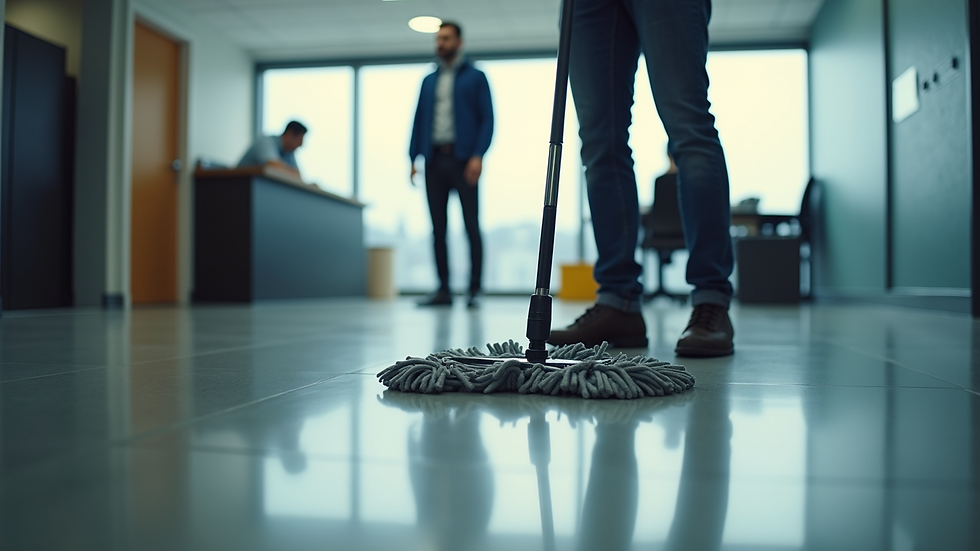The Role of Clean Offices in Workplace Productivity
- Celeste Johnson
- Aug 25, 2025
- 3 min read
A clean office environment is more than just visually appealing - it plays a crucial role in enhancing workplace productivity. When employees work in tidy, organized spaces, they tend to feel more motivated, focused, and less stressed. This blog post explores how clean offices contribute to better productivity, the psychological and physical benefits of cleanliness, and practical tips to maintain a spotless workspace.
How Clean Offices Boost Employee Focus and Efficiency
A cluttered or dirty office can be distracting and overwhelming. When desks are piled with papers, dust accumulates, or trash bins overflow, employees may find it difficult to concentrate on their tasks. Clean offices help reduce distractions by providing a calm and orderly environment.
Improved concentration: A tidy workspace minimizes visual noise, allowing employees to focus on their work without unnecessary interruptions.
Faster task completion: When everything is organized and easy to find, employees spend less time searching for documents or supplies.
Reduced errors: A clean environment helps prevent mistakes caused by misplaced items or overlooked details.
For example, a study found that workers in clean offices completed tasks 15% faster than those in cluttered spaces. This shows that cleanliness directly impacts efficiency and output.

The Health Benefits of Maintaining Clean Offices
Clean offices are essential for maintaining good health among employees. Dust, allergens, and germs can accumulate quickly in shared workspaces, leading to increased sickness and absenteeism.
Reduced spread of illness: Regular cleaning and disinfecting surfaces help prevent the transmission of viruses and bacteria.
Better air quality: Dust and allergens are removed, reducing respiratory issues and allergies.
Lower stress levels: A clean environment promotes mental well-being, which can reduce stress-related health problems.
Employers who invest in professional cleaning services, such as office cleaning halifax, often see a decrease in sick days and an overall healthier workforce.

Practical Tips for Keeping Offices Clean and Productive
Maintaining a clean office requires consistent effort and good habits. Here are some actionable recommendations to keep your workspace spotless and conducive to productivity:
Implement daily cleaning routines: Encourage employees to tidy their desks at the end of each day.
Use designated storage: Provide shelves, drawers, and filing cabinets to keep items organized.
Schedule regular professional cleaning: Hire cleaning services to deep clean carpets, windows, and common areas.
Promote cleanliness culture: Educate staff on the importance of hygiene and cleanliness.
Provide cleaning supplies: Make disinfectant wipes, hand sanitizers, and trash bins easily accessible.
By following these steps, offices can maintain a clean environment that supports employee well-being and productivity.

The Psychological Impact of Clean Workspaces
Clean offices do not just improve physical health and efficiency - they also have a significant psychological impact on employees. A neat environment can boost mood, motivation, and job satisfaction.
Sense of control: A tidy workspace gives employees a feeling of control over their environment, which can reduce anxiety.
Positive first impressions: Clean offices create a professional image for clients and visitors, boosting company reputation.
Enhanced creativity: A clutter-free space allows the mind to think more clearly and creatively.
Employers should recognize that investing in cleanliness is also an investment in employee morale and mental health.
Creating a Long-Term Clean Office Strategy
To sustain the benefits of a clean office, businesses need a long-term strategy that integrates cleanliness into daily operations.
Set clear cleaning policies: Define responsibilities and schedules for cleaning tasks.
Monitor and evaluate: Regularly assess the cleanliness of the office and gather employee feedback.
Incorporate technology: Use tools like air purifiers and automated cleaning devices to maintain hygiene.
Encourage personal responsibility: Motivate employees to keep their personal work areas clean.
By embedding cleanliness into the company culture, organizations can ensure a productive and healthy workplace for years to come.
Maintaining clean offices is a vital component of workplace productivity. From improving focus and health to boosting morale and creativity, the benefits are clear. By adopting practical cleaning habits and investing in professional services, businesses can create an environment where employees thrive and perform at their best.



Comments